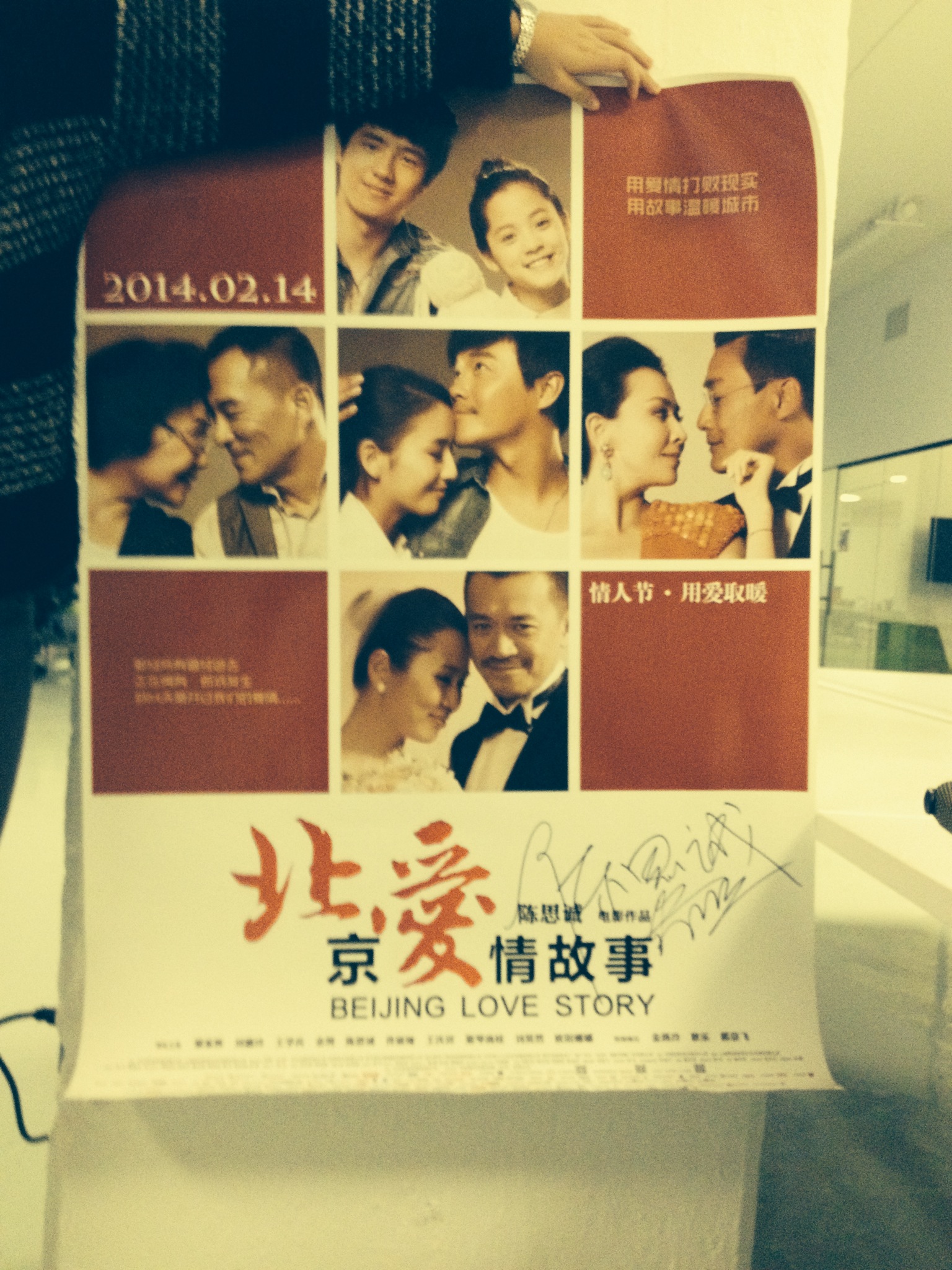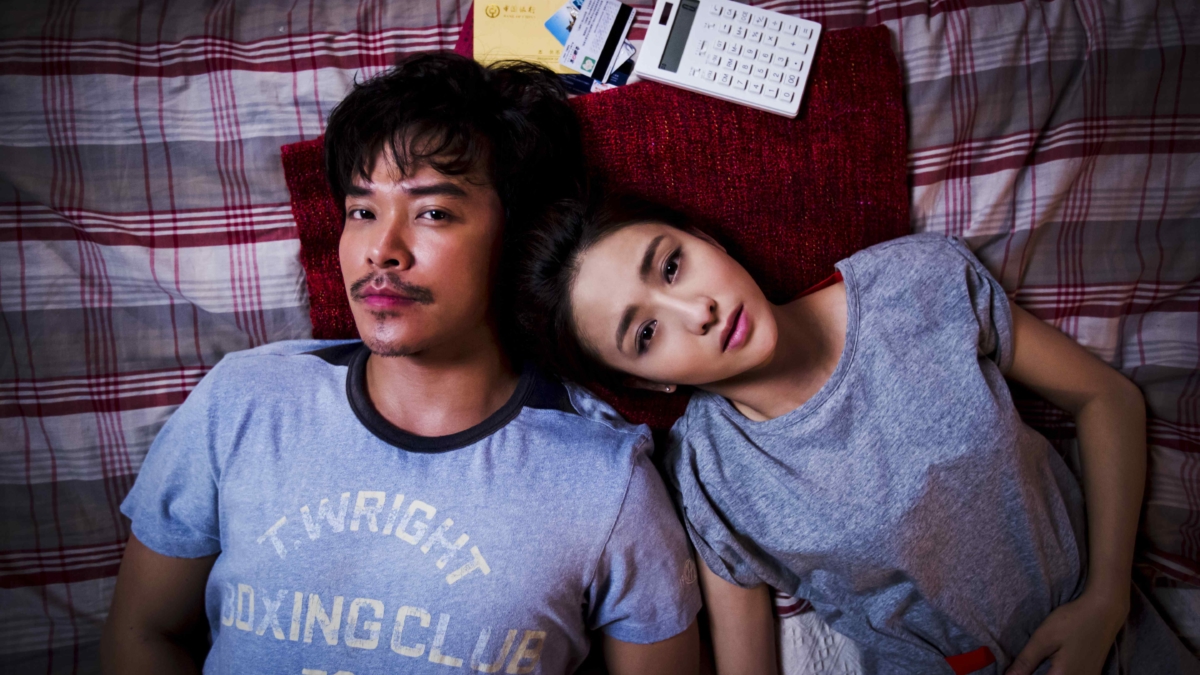Here is a Valentine’s Day treat!
BEIJING LOVE STORY was a massively popular 2012 television show that follows the romantic pitfalls of couples in the Mainland’s capital city. The feature spin-off stars Tony Leung Ka Fai (Tai Chi Hero, Cold War), Wang Xuebing (Eternal Moment), Siqin Gaowa, Carina Lau, Tong Liya, Jin Yanling, Yu Nan and Wang Qinxiang. Chen Sicheng, who wrote and directed the film (and directed the television series), also co-stars.
[youtube]https://www.youtube.com/watch?v=kmOZ6Ptw5Uw[/youtube]The film plays today at AMC Empire 25, day-and-date with the release in mainland China.
Courtesy of ChinaLion Distribution Company, we have in house a poster of Beijing Love Story autographed by the newly-wed celebrity couple Chen Sicheng (director/co-actor) and Tong Liya (co-actor). For which we are having a little draw to give it away!

To enter a draw to win this poster, send to info@asiancinevision.org a picture of two ticket stubs to the same screening of BEIJING LOVE STORY during its NYC theatrical run. Please indicate in the subject line “Beijing Love Story Poster Giveaway” to enter the draw.
Visit BEIJING LOVE STORY’s official website to learn more about the film (there is even a competition to win FLIGHT TICKETS going on)!
Beijing Love Story: A Star-Packed Romance Mirroring Love in A New China
by Bo An
Released on Valentine’s Day 2014 in both China and the U.S., Beijing Love Story (北京爱情故事), the feature debut of Chinese writer/director Chen Sicheng (陈思成), has grossed over 50 million US dollars internationally. The movie presents the struggle of different generations in China, especially the younger generation, to hold on to the old values in a rapidly developing and conflict-packed metropolis. The five relatively independent stories, which some critics say recount the entire emotional experience of a woman over her whole life, cover such issues as a long distance relationship, premarital pregnancy, infidelity, the parting of lovers by death, and the breaking of the Chinese bias against not owning a home before committing to marriage. Through these issues, the movie conveys the seemingly lasting notion that love solves all problems, a perspective also reflected by the logo shown at the end of the movie’s trailer (“用爱情打败现实, 用故事温暖城市” which literately means “Defeat the reality by love and warm up the city with stories”.). The stories reflect the turbulent social realities in today’s Beijing, which are radically challenging how concepts such as love, sex, relationships and marriage are perceived within traditional Chinese culture.
The movie’s commercial success rests mainly on its star-studded cast. From Hong Kong stars Carina Lau (刘嘉玲) and Tony Leung Ka Fai (梁家辉), to the internationally acclaimed Yu Nan (余男) and the domestically well-known Siqin Gaowa (斯琴高娃), together with the new rising stars, who are also a couple, Chen Sicheng and Tong Liya (佟丽娅), Beijing Love Story adeptly casts stars that appeal to almost every audience age group.
As the Chinese movie industry as a whole steps into a period like Hollywood’s classical era, China’s major studios’ awareness of the importance of stars, and their vertical integration in the process, also mimics the customary practices of 30s’ Hollywood. That is to say, in today’s China the economic importance of stars and the using of star power is becoming crucial at every level of a big budget motion picture project, namely the level of development, production and distribution.
At the development stage, which is the first level of the vertical integration, as Tino Balio argues in his book, Grand Design: Hollywood as A Modern Business Enterprise 1930-1939, “stars’ popularity and drawing power creates a ready-made market for movies, which reduces the risks of production financing”. A representative example can be how MGM, the studio who had the largest and most prestigious stable of stars in Hollywood, took maximum advantage of its talent pool which included Greta Garbo, Joan Crawford, Norma Shearer and Clark Gable. Back in the ‘30s, as Tino Balio describes, “Irving Thalberg instituted a ‘galactic’ system of casting a picture, whereby two or more stars were teamed to increase its box-office power.” In the case of Beijing Love Story, starting their careers in the ’80s, actress Carina Lau and actor Tony Leung Ka Fai are both Hong Kong Film Award winners and celebrities whose works and private lives attract millions of eyeballs in the entire Greater China area. Meanwhile, the younger mainland stars Chen Sicheng and Tong Liya also have drawn massive public attention for Beijing Love Story due to the enormously successful TV series in 2013 with the same title, in which they both starred and from which they started their relationship and marriage.
Secondly, at the production level, all departments, including screenplay, costumes and makeup, lighting and camera work are designed to make sure the images of the stars find favor with the public and consequently strike a chord among contemporary Chinese moviegoers. For instance, the established Hong Kong actress’ and actor’s images are a seemingly ideal wealthy glamorous upper class couple who have managed to stay married for 20 years, while the rising mainland stars’ images are as a young working class couple who believe in true love and are still struggling to find their place in the glorious yet competitive and stressful capital city. Such arrangements not only cater to the audience’s craving for the style of upper-middle class, the nostalgia for the stable long-term marital relationship, but also address and give vent for the anxiety of the struggling urban drifters and ant-peep.
In addition, Beijing Love Story’s commercial success also benefits from its production and distribution company. Wanda Media Co., Ltd (万达影视传媒有限公司)’s crafty promotion strategies take advantage of the parent corporations’ resources in a variety of industries. The entity is led by Wang Jianlin, a tycoon in real estate, tourism, hotels, and entertainment who just shocked the global entertainment industry by announcing plans to spend more than 8 billion US dollars to build Qingdao Oriental Movie Metropolis — the world’s largest film and television industry project. Wanda Media infuses love, the theme of Beijing Love Story, into all of its products and services, such as fireworks, real estate, automobiles, online shopping, movie theaters, and karaoke bars. Almost all the campaigns they did last year for their products and services shared the same topic: love, which resulted in the fact that all the parent corporations’ and its business associates’ products and services and Beijing Love Story promoted each other. To maximize the overall promotional effect, stars’ names, images and even information about their private lives dominated advertising and publicity in all media campaigns at every stage of the movie’s distribution.
Interestingly, although today’s Chinese studios like Wanda Media’s practice in regarding of their colaborations with stars was already a standard in Hollywood’s classical era, star packed films in today’s America are actually losing their fanciness. Instead, moviegoers’ attention in the U.S. has been gradually transfered to other elements such as a movie’s storyline. The phonomenon has been confirmed by more and more box office flops with international acclaimed super stars. And that the short revival of all star casts movies such as Love Actually and recent Woody Allen films are actually mimicries of the 30s Hollywood, if these movies’ successes do not totally rest on its excellent stories and other formal aspects.
Although the film shows inconsistencies in tone and farfetched surrealistic plots occasionally emerge, with its resonant theme, smart pick-up lines which have generated discussions among moviegoers, and crafty promotional strategies and use of star power, Beijing Love Story has harvested relatively positive receptions from both Chinese audiences and critics.

